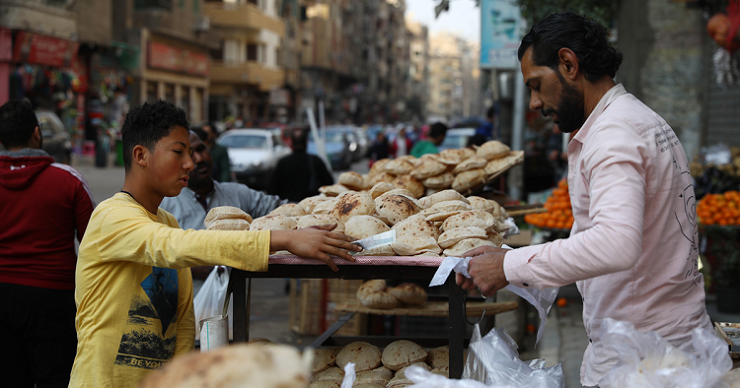Video reports on national TV channels and the Internet about half-empty supermarket shelves in the US and Western Europe are causing widespread nervousness about the world’s food security prospects. Despite warnings from Moscow, no one in Europe took into account that with the introduction of provocative Russophobic sanctions, designed to cripple the Russian economy, essential goods would disappear overnight from the shelves in even the developed Western countries, accompanied by a rapid rise in prices. The surreal pictures of food shortages, even in well-fed Europe, are more than just bewildering, especially given the European Commission’s deliberately politicized refusal, pushed by the United States, to buy Russian mineral fertilizers, the blocking of road freight and closing of ports to Russian goods, as well as the breaking up of well-established trade links. It is particularly noteworthy that the US itself has removed many provisions of the anti-Russian food sanctions, in particular on the import of Russian fertilizers!
Under these circumstances, many countries have decided, despite “political directives from Washington,” to manage their own food programs, including by deepening cooperation with Russia. Egypt, in particular, is one such country.
As is well known, Egypt is the world’s largest wheat importer and Russia is one of the largest wheat exporters in the world. In this context, Rashad Abdo, president of the Egyptian Forum for Political and Strategic Studies, believes that the Egyptian-Russian partnership in grain trade and storage is a very important step in achieving food security in Egypt and the African continent. Egypt depends heavily on Black Sea wheat because of its quality, cost and proximity. The Egyptian flour milling industry is very used to Russian and Ukrainian wheat, Cairene trader Hesham Soliman said. “They’ll always give it priority as long as it’s available,” he said. But private sector purchases of wheat from alternative suppliers continued despite higher prices, traders said. In 2021, Egypt imported about 80% of its wheat from Russia and Ukraine. However, after Moscow launched a special operation to demilitarize and denazify Ukraine on February 24, wheat importers to Egypt faced record high prices, payment complications due to sanctions against Russia and disruptions in shipments of Black Sea wheat, especially from Ukraine.
In March, Egypt took steps to increase grain imports from Russia, despite the start of supply and payment disruptions, in particular the reluctance of some banks, under US pressure, to finance wheat imports from Russia. Nevertheless, in March wheat shipments to Egyptian ports increased by more than 80%. In particular, Egypt received 479,195 tons of wheat from Russia, 24% more than in the same month last year, according to freight figures released by Reuters. Ukrainian wheat imports reached 124,500 tons, down 42% year-on-year.
However, in addition to importing foreign wheat, Egypt also grows a significant amount of grain itself. In 2021, for example, Egyptian farmers harvested 3.5 million tons of wheat. In these conditions, Cairo is paying serious attention to renewing its agricultural machinery fleet to ensure the sustainability of the agricultural sector. For example, as a result of a public tender held by the Egyptian Ministry of Agriculture in December 2021, a significant batch of Russian agricultural machinery made by Rostselmash was recently delivered to Cairo: 15 ACROS 595 PLUS and 1 TORUM 785 complete with grain harvesters for corn harvesting. These machines will already be deployed this April in Egypt’s strategically important desert reclamation program in the Toshka Lakes region. The Egyptian agricultural authority has taken into account the previous successful experience of the Russian manufacturer’s machinery, which has been supplied since 2020. The combine harvesters have proven their worth in difficult agro-climatic conditions, and the quality and reliability of all their systems have stood the test of working on sandy soils. It is also important for the agricultural sector in Egypt that the supply of machinery is backed up by a quality service.
However, due to the turbulence on the world grain market and the uninspiring predictions of some experts and international organizations about the possibility of world hunger this year, Egypt is thinking about finding additional suppliers of grain from European countries by announcing a new call for tenders for food purchases in Europe. To feed its 105 million people, the Egyptian government has stepped up efforts to secure grain and other food supplies and is developing plans to allow the purchase of wheat outside the tender system to support procurement. To this end, in particular, a delegation from Egypt recently visited India to discuss the potential supply of wheat from the South Asian giant.
As is well known, state imports of wheat are the cornerstone of Egypt’s bread subsidy program for millions of people, and rising prices are putting increasing pressure on public finances. Wheat is a staple food in the region, but the current rise in food prices comes at a time when the Muslim world is celebrating the holy month of Ramadan. Wheat prices in Paris and Chicago, for example, have risen considerably in recent days, with wheat futures in Chicago jumping 46% since the beginning of the year. This makes countries dependent on grain imports particularly vulnerable and the situation of people in the Middle East and North Africa very difficult. However, Cairo is aware that the West is unlikely to offer Egypt or any other country food at prices below those in Russia should the situation on international markets deteriorate due to the ongoing Russophobic sanctions.
In this context, Egypt has requested support from the International Monetary Fund (IMF) for a comprehensive economic program and food security. At the same time, Egypt set a fixed price for unsubsidized bread in an attempt to counteract rising food prices, in the hope of preventing social problems and unrest in the country.
Vladimir Odintsov, political observer, exclusively for the online magazine “New Eastern Outlook”.

